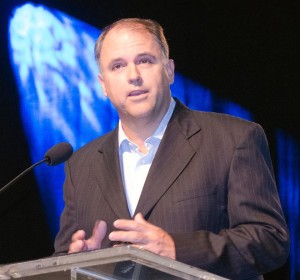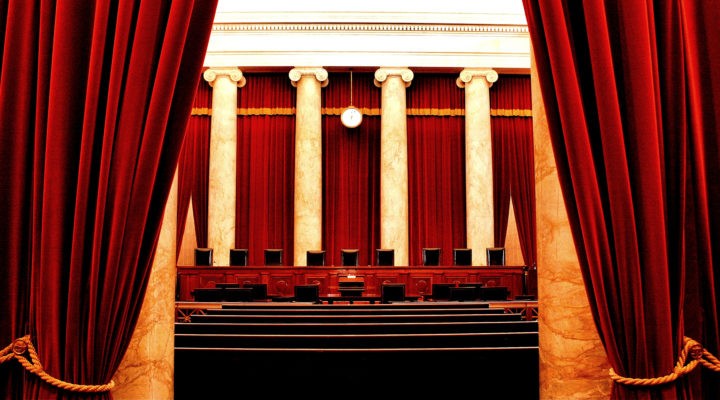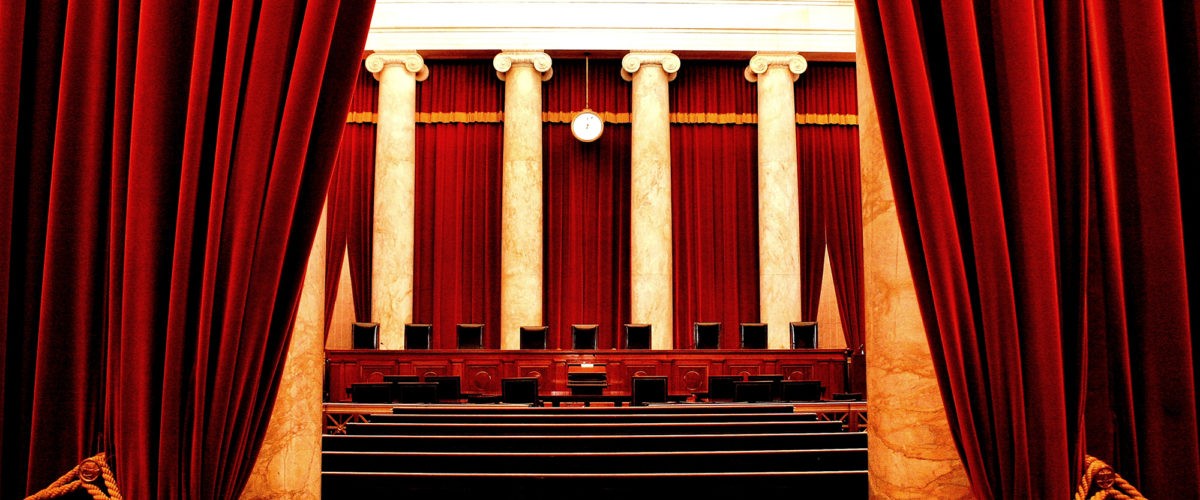The case of a Baptist state convention leader fired because of what he considers undue influence by a national Southern Baptist Convention agency is drawing intense national interest — but not for the underlying merits of the case itself.
More than three dozen outside parties to the case have joined in friend-of-the-court briefs asking the United States Supreme Court to end the case brought by Will McRaney, former head of the Baptist Convention of Maryland and Delaware, against the SBC’s North American Mission Board. Those briefs — six in total with multiple parties to each — uniformly claim that allowing McRaney’s case to proceed would be a violation of religious liberty rights afforded churches.
For his part, McRaney contends the case falls outside the “religious exemption” given by previous court rulings and therefore would not ask the court to intervene in ecclesial matters. The case now before the Supreme Court is seen as a key test of whether government — at any point — should be allowed to weigh in on employment disputes within religious bodies.
History of the McRaney case
What makes McRaney’s case potentially different from previous cases is that he has not sued his former employer who fired him. He makes no claim against the Baptist Convention of Maryland and Delaware, one of 42 autonomous state and regional conventions that willingly cooperate with the SBC and its agencies.

Will McRaney
When the SBC’s NAMB sought to change its relationship and funding agreement with the Maryland-Delaware convention, McRaney resisted. He contends he was an early victim of a dispute between state Baptist conventions and the national SBC. His lawsuit claims that because he resisted the changes required by NAMB — and specifically its president, Kevin Ezell — Ezell and other NAMB officials demanded his termination by the two-state convention, which in theory is fully independent of the SBC. And he claims that demand came with a threat to withhold $1 million in annual funding if McRaney were not fired.
Further, according to court documents: McRaney alleges that “NAMB leadership continued to interfere with business and contractual relationships that McRaney had with third parties.” That included McRaney being disinvited to speak at events sponsored by two other state Baptist conventions, one in Florida and one in Mississippi.

Kevin Ezell
Also, according to court documents, McRaney alleges “that his photo was posted at the NAMB headquarters welcome desk with a caption that stated he was not to be trusted.”
What began as a state court case in Mississippi in May 2017 got elevated to a federal court at the request of NAMB’s attorneys. Nearly two years later, in April 2019, Judge Glen Davidson of the U.S. District Court Northern District of Mississippi dismissed McRaney’s lawsuit, saying the court could not consider McRaney’s claims because of a tenant known as the ecclesiastical abstention doctrine.
McRaney argued on appeal that the ecclesiastical abstention doctrine did not apply. That led a three-judge panel of the U.S. Court of Appeals for the Fifth Circuit in July 2019 to reverse the earlier dismissal, saying this case appeared to be about more than “purely ecclesiastical questions.”
Three dozen petitioners to the court who are siding with NAMB say the McRaney case is just such a case of national significance the high court must rule on.
In August 2020, NAMB asked for a full court hearing of the case rather than it being sent back to the District Court judge who had ruled before. That request was denied in November 2020, prompting NAMB on Feb. 17 of this year to file a petition for a writ of certiorari, asking the Supreme Court to review the earlier ruling of the U.S. Court of Appeals for the Fifth Circuit.
Seeking a writ of certiorari is the primary means to petition the Supreme Court to review a lower court ruling. The court typically accepts fewer than 150 of more than 7,000 cases requested for review each year. Cases that are accepted tend to have national significance on issues that have not been previously clarified or that the court believes need new clarification.
The three dozen petitioners to the court who are siding with NAMB say the McRaney case is just such a case of national significance the high court must rule on it. That ruling, however, would not be about the merits of the original claim, but about whether McRaney’s case should be heard at all by any court. They uniformly contend it should not because to do so would create a violation of religious liberty protections.
Law professors weigh in
Among the petitioners to the Supreme Court on NAMB’s behalf are 10 law professors who specialize in religious liberty issues. They are Elizabeth Clark (BYU), Robert Cochran Jr. (Pepperdine), Carl Esbeck (University of Missouri), David Forte (Cleveland State University), Richard Garnett (Notre Dame), Christopher Lund (Wayne State), Michael McConnell (Stanford), Michael Moreland (Villanova), Robert Pushaw (Pepperdine), and David Skeel (University of Pennsylvania).
The professors are emphatic in their appeal to the court, saying churches and church-related organizations like NAMB must be guaranteed “categorical immunity” from court interference with personnel matters. That McRaney’s claim is framed under state civil law should be of no consequence, they add.
“That is precisely the kind of intra-church power struggle that implicates the church autonomy doctrine.”
“This case involves a minister protesting his dismissal from church leadership after having ‘conflicting visions about the growth of the church,’” the brief states. “That is precisely the kind of intra-church power struggle that implicates the church autonomy doctrine.”
Previous court rulings that were deemed acceptable interference of civil court in religious matters involved property, not personnel, the professors said. “Unlike church property disputes, which may be decided by ‘neutral principles” of law, personnel decisions — by their nature — cannot be decided simply by ‘neutral principles.’”
Even though McRaney’s claim concerns autonomous Baptist entities, the professors still see the case as about the “internal governance of the church.”
This is one of the curious aspects of the case, since Baptists believe in a non-hierarchical form of governance. Every congregation, every association, every state convention is said to enjoy complete independence in its decision-making. This is unlike the Roman Catholic Church, United Methodist Church or Episcopal Church, for example, where bishops and other leaders exercise authority over local congregations and national ministries.
McRaney has contended the SBC can’t have it both ways — either the Maryland-Delaware convention is fully autonomous from NAMB and therefore should not have been influenced by NAMB in its personnel decisions, or the SBC actually practices a form of hierarchical governance through the power of funding.
The law professors counter that “the employer-employee relationship does not define the bounds of the church autonomy doctrine. The ministerial exception is ‘a subset of the church autonomy doctrine,’ which more broadly shields all matters of internal church governance from judicial intrusion. … At bottom, church autonomy is a freedom of a religious organization to govern its internal affairs without interference by government.”
SBC Ethics and Religious Liberty Commission weighs in
The SBC’s own Ethics and Religious Liberty Commission got in hot water with SBC leaders when, early in the McRaney case, it joined with the Thomas More Society in a friend of the court brief that said the SBC, NAMB and state conventions do have a hierarchical relationship. The ERLC later amended its position on that statement, but the issue continued to dog the agency’s executive director, who last week announced his resignation amid criticism from the right-most flank of the SBC over several issues.
Now, the ERLC has petitioned the Supreme Court in a brief joined by the Mormon Church, the National Association of Evangelicals, the Lutheran Church – Missouri Synod, Church of God in Christ, Christian Legal Society, Jewish Coalition for Religious Liberty, and the Islam and Religious Freedom Action Team of the Religious Freedom Institute.
“This doctrine of church autonomy is a declaration of independence for churches and denominations, securing the freedom to govern their own internal religious affairs.”
This unlikely alliance of religious organizations says the Supreme Court must rule against the McRaney case proceeding because the First Amendment “bars judicial review of truly ecclesiastical matters like ministerial employment, as well as church polity and government. This doctrine of church autonomy is a declaration of independence for churches and denominations, securing the freedom to govern their own internal religious affairs.”
Their brief says McRaney’s suit is “a stealth attack on the Baptist form of church government. Baptist ecclesiology means that spiritual authority is vested with individual, autonomous congregations that voluntarily join together in the cooperative mission of spreading the gospel of Jesus Christ. … McRaney’s claims invite federal courts to sit in judgment on a religious community’s internal dispute over cooperative ministry strategy.”
16 states join the fray
Republican attorneys general in 16 states also believe the case is of national significance and have joined together in their own brief to the court, led by Ken Paxton of Texas.
In addition to Texas, those states are Alabama, Arizona, Arkansas, Florida, Georgia, Idaho, Kentucky, Louisiana, Mississippi, Montana, Nebraska, Oklahoma, South Carolina, Tennessee and Utah.
The attorneys general state their intention is to “protect the First Amendment rights of religious institutions” within their borders.
“The Religion Clauses of the First Amendment forbid the ‘establishment of religion’ and guarantee the ‘free exercise’ of religion, meaning religious institutions have the freedom to decide matters of faith, doctrine, and internal governance without governmental interference,” they wrote.
These states “have an interest in keeping their courts from deciding, contrary to the First Amendment, matters of religious doctrine or governance.”
At the same time, these states “have an interest in keeping their courts from deciding, contrary to the First Amendment, matters of religious doctrine or governance. State courts frequently look to federal courts for the interpretation and application of the First Amendment.”
Thus the attorneys general “have an interest in preventing their courts from being used to suppress religious freedom.”
Other briefs filed
Among the other friend-of-the-court briefs already filed in support of NAMB is one by two Orthodox Jewish organizations that claims the McRaney case, if allowed to proceed, “would undermine the ability of religious schools to work together with affiliated umbrella support organizations in designing their educational programming” and “have disproportionate consequences for non-hierarchical minority faiths by subjecting their doctrines and practices to the scrutiny of secular courts.”
Yet another brief by has been filed by the National Legal Foundation and the International Conference of Evangelical Chaplain Endorsers. These organizations claim that “a central benefit of the church autonomy doctrine is to allow all religious organizations, of whatever overall structure, to avoid the fiscal and ministry cost necessarily incurred by litigation of the organization’s rationale.”
The sixth brief has been filed by the American Association of Christian Schools and the Association of Christian Schools International, which claim court interference in the SBC’s internal affairs could spill over to the way Christian schools manage their personnel, who may or may not be clergy.
The brief explains: “Many religious schools … minister to students without the oversight of a church, synagogue, mosque or other similar religious body. Instead, these schools collaborate with other religious organizations … to accredit their educational programs and certify their teachers and administrators — consistent with both organizations’ doctrinal standards. The Fifth Circuit’s holding would apply state tort law to this relationship, creating a two-tiered system of religious liberty that favors hierarchical religious organizations over congregational, associational or otherwise more horizontal ones — even when they make the same decisions for the same reasons.”
In his own filing with the Supreme Court, McRaney counters the claims of NAMB and those who have filed briefs in support of NAMB. Allowing his case to proceed would not depart from the court’s prior decisions, nor would it conflict with decisions by other federal courts of appeals and state courts of last resort, he says.
Related articles:
SBC agency’s appeal to Supreme Court touches on religious liberty, defamation and Baptist autonomy
Southern Baptist polity on trial in lawsuit appeal
What’s old is new again: Conservatives threaten funding over SBC’s ethics agency


